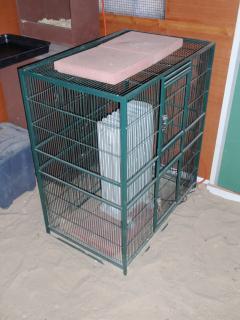Here's my set up:
It's a DeLonghi oil filled radiator ($39 at Lowe's) set inside a birdcage on patio blocks. The cage prevents the chickens from coming in direct contact with the radiator, roosting on it, or knocking it over. A couple of patio blocks are also on the top of the birdcage to make sure poop doesn't fall down onto the radiator. My chickens do like to hang out up there on very cold days.
On freezing nights (and days when we get them), I run the radiator at its lowest setting. The radiator never gets too hot to the touch, even when I had to run it continuously from Monday morning to Saturday morning this week (the whole week stayed below freezing and even into the teens). The inside of our 8' x 8' x 7' insulated coop stayed steady at around 40-43 degrees. The heater has its own thermostat, although you can't set it directly to a particular temperature. It cycles on and off to maintain the level that you set it for.
I use sand on the floor of my coop so I don't have to be concerned about flammable bedding like pine shavings. On the other thread, I notice folks concerned about using oil filled radiators in a dusty environment, but I'm puzzled about how this really applies to the actual units in question. The radiator is sealed, and doesn't have any venting that I can see that could become dust clogged. I do wipe down the outside of the radiator periodically, just in case, because I'm a worry wort.
It is important to run this radiator on full for 24-48 hours outdoors (on a porch or in your garage, etc.) to burn off the protective coating they place on it for shipping. There's a bad odor during this process, and you would not want to risk the possibility that the fumes could be toxic to birds. But after the coating burns off, there's no odor or fumes from the radiator.
 !
!



